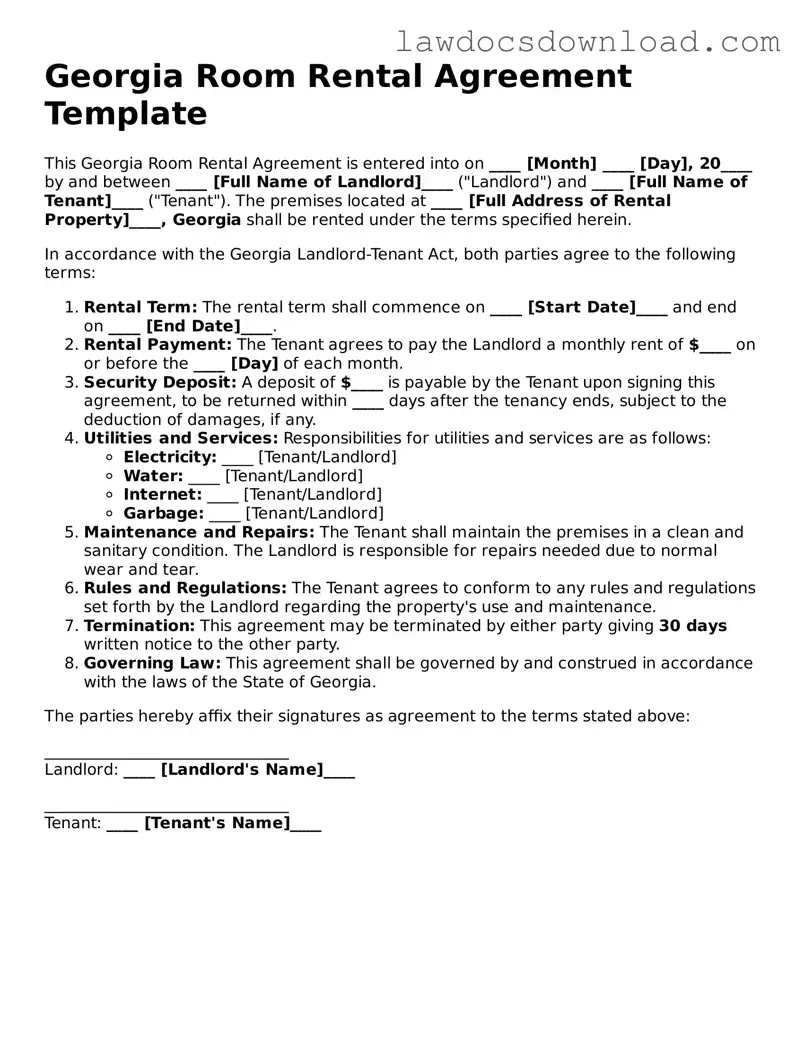The Lease Agreement is closely related to the Georgia Room Rental Agreement as both establish the terms and conditions under which a property is rented. While the Room Rental Agreement focuses on the rental of a single room within a larger property, a Lease Agreement typically covers the rental of an entire apartment or house. Both documents outline rental payments, security deposit terms, and the responsibilities of both the landlord and the tenant, ensuring a clear understanding between the parties involved.
A Sublease Agreement shares similarities with the Georgia Room Rental Agreement as it allows a tenant to rent out a portion or all of a leased property to another party. This could include renting out a single room, mimicking the Room Rental Agreement's structure. Both agreements detail the rights and obligations of all parties and establish terms such as rent, duration of the rental, and usage of common areas, necessary for managing shared living situations effectively.
The Landlord-Tenant Agreement, while a more general term, encompasses agreements like the Georgia Room Rental Agreement. It refers to any contract between a landlord and a tenant that specifies the rental of residential property. Whether renting a whole property or just a room, these agreements serve to protect the interests of both the landlord and tenant, stipulating rent, lease duration, and maintenance responsibilities.
A Month-to-Month Rental Agreement resembles the Georgia Room Rental Agreement in its flexibility regarding lease duration. Unlike fixed-term leases, month-to-month agreements do not have a set end date and can be renewed each month. This type of agreement can be used for renting a room, indicating terms such as rental amount, utility payments, and termination notice requirements, providing both landlords and tenants with greater flexibility.
A Co-Tenancy Agreement outlines the arrangements and responsibilities of tenants sharing a leased property and has parallels to the Georgia Room Rental Agreement. It typically covers issues like rent division, utility payments, and usage of common areas, ensuring that all roommates are on the same page. This is especially relevant when the Room Rental Agreement involves multiple individuals renting different rooms in the same property.
The Vacation Rental Agreement is applicable for short-term rentals and shares common features with the Georgia Room Rental Agreement, especially when the latter is used for temporary lodging. Both agreements specify the rental period, payment details, and house rules, albeit the Vacation Rental Agreement focuses on short-term stays and might include specific clauses related to seasonal renting, cleaning, and check-out procedures.
A Property Management Agreement holds similarities to the Georgia Room Rental Agreement, as it outlines the responsibilities and expectations between property owners and the managers or management companies they hire. While the Room Rental Agreement directly concerns the landlord and tenant relationship, the Property Management Agreement covers the operational aspects of managing the rental, including tenant screening, rent collection, and maintenance duties.
Lodger Agreements are akin to the Georgia Room Rental Agreement in that they both involve renting a room within a property where the owner also resides. These agreements will outline specifics like rent, house rules, and use of shared spaces, fostering a clear understanding between the homeowner and the lodger. The main difference lies in the permanence and legal rights afforded by each agreement, with lodger arrangements typically being less formal.
A Roommate Agreement, though not a formal lease, complements the Georgia Room Rental Agreement by addressing the relationship between tenants sharing the same rented space. It focuses on internal arrangements such as chore distribution, quiet hours, and guest policies. While the Room Rental Agreement establishes the legal lease terms with the landlord, a Roommate Agreement is a private contract among tenants for their mutual convenience.
A Tenant's Association Agreement, while not directly related to individual rental agreements, shares a collective spirit with the Georgia Room Rental Agreement when tenants band together to form or join a tenants' union. These associations advocate for tenants' rights and work to improve living conditions. The process of forming such agreements involves understanding tenant-landlord laws, much like negotiating a Room Rental Agreement, emphasizing communication and legal awareness within the rental community.

